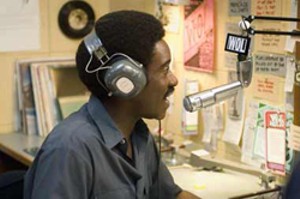Published August 15, 2007 at 4:00 a.m.
Some people’s lives are simply too free-form to fit tidily into the standard biopic formula. Petey Greene was a talk-radio personality who came to prominence in Washington, D.C., during the late ’60s, and for 53 years he lived exactly such a life. Someday, someone just may make a great movie about it. Kasi (Eve’s Bayou) Lemmons has not.
Don Cheadle is all pimped out with no place to go, thanks to her unimaginative direction and a screenplay that leaves no cliché of the genre unmilked — while leaving whole chapters of Greene’s story untold. As the movie gets under way, for example, Greene is spinning discs and perfecting his trademark patter over a prison sound system. Yet the viewer never learns the nature of the crime that landed him there. Did he get caught with a nickle bag, or did he go on a killing spree? That kind of thing is nice to know.
Chiwetel Ejiofor costars as Dewey Hughes, the program director at a local station who encounters the jailhouse jock while he’s visiting a family member serving time in the same facility. “Look me up when you get out,” he tells Greene, who senses the meeting is a life-defining moment. Hughes is thinking he might fix the ex-con up with a job as a janitor. Greene gets it in his head he’s going to walk straight out of the pen and into a broadcast booth.
The first 30 minutes of the movie are much more fun than the hour and a half that follows. Cheadle does a marvelous job of suggesting the mix of motormouth egomania and deep-seated self-doubt that made Greene a combustible talent. He shows up at WOL with his girlfriend (Taraji P. Henson) in tow and summons Hughes. When he learns that a career in radio is not, in fact, awaiting him, he’s so indignant that he convinces dozens of the city’s black residents the station doesn’t want them as listeners and persuades them to picket outside its offices. Martin Sheen plays the company’s square owner. Watching Cheadle talk Ejiofor into giving him a shot and then watching Ejiofor set it up behind his boss’ back are good for more than a few laughs. But then the high spirits, the telling interplay between characters — in short, everything that makes the film’s first act entertaining — abruptly come to an end. The rest of the movie is a mess.
The director dusts off every tired trick in the Rise and Fall of Somebody Famous book. Greene’s street-wise patois makes him an overnight hit with D.C.’s black community. This success leads to opportunities on local TV, stand-up work in comedy clubs and, ultimately, to a make-or-break appearance on “The Tonight Show.” Since the Greene we’re shown is a regulation “tortured genius,” his ascent is followed by booze-fueled implosion. As Lemmons tells it, he was drunkenly blowing the Carson gig one minute and living out his days as a recluse the next.
The film provides no explanation of why Greene would suddenly stop doing the job he loves, his talk show on WOL. Instead, it lurches into the future, when Hughes has traded his suit for a microphone and attracted his own following as a radio host. This disastrous shift in focus might have something to do with the fact that the script was cowritten by Hughes’ son.
It’s standard operating procedure for movies like this to make use of recognizable music from the period to help set the tone. But even here, Lemmons’ judgment lapses. She goes so totally overboard with the device, matching songs to scenes by theme, that when Greene takes the station elevator, you half expect to hear Isaac Hayes start singing “Shaft.”
The filmmaker grasps at one straw after another in an attempt to give her picture the illusion of gravitas. The most desperate example takes the form of a prolonged sequence in which Greene shares his thoughts with a distraught listenership following the assassination of Martin Luther King Jr. Is this Greene’s story, or Hughes’, or King’s? I haven’t even mentioned the lengthy section devoted to James Brown.
The movie’s subject is MIA for much of the final act. Then suddenly he’s dead and being eulogized. Even in the script’s tearjerking eulogy, no mention is made of the role Greene played as a community activist right to the end. Lemmons wants us to remember him as some sort of tragic, trail-blazing martyr, but she tells his story in such muddled fashion that the real Petey Greene never comes into focus. As a result, Talk to Me proves a message movie with precious little to say.
Talk to Me
- Running Time: 118 min
- Rated: R
- Theaters:
More By This Author
Speaking of Movies, movie Review
-

Next Month Brings the Final Curtain for Palace 9 Cinemas
Oct 27, 2023 -

Book Review: 'Save Me a Seat! A Life With Movies,' Rick Winston
Aug 30, 2023 -

Steve MacQueen Named Executive Director of Vermont International Film Festival
May 22, 2023 -

Vermonters Are Going Back to the Movies — Under the Stars
Aug 26, 2020 -

Where to Catch a Movie Near Burlington
Sep 11, 2018 - More »
Comments
Comments are closed.
From 2014-2020, Seven Days allowed readers to comment on all stories posted on our website. While we've appreciated the suggestions and insights, right now Seven Days is prioritizing our core mission — producing high-quality, responsible local journalism — over moderating online debates between readers.
To criticize, correct or praise our reporting, please send us a letter to the editor or send us a tip. We’ll check it out and report the results.
Online comments may return when we have better tech tools for managing them. Thanks for reading.














































